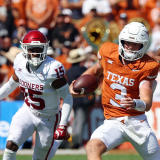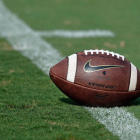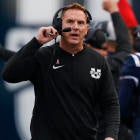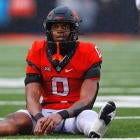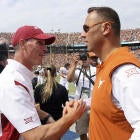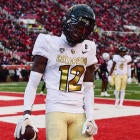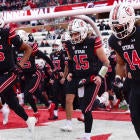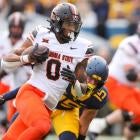Let's get past the appeals and the outrage and faux presidential oversight. It seems that no one who really matters on the subject wants a clear, hard and fast definition of academic fraud. Never mind it is one of the pillars of the collegiate model. The best way to get past any academic misconduct these days is to push back.
It worked for North Carolina in 2017.
We'll see if it works for Missouri, which was hammered by the NCAA on Thursday.
Mizzou was the latest "victim" of the floating target that is defining academic fraud. The football program was given a postseason ban because of what everyone seems to agree was a rogue booster doing classwork for 12 athletes.
Even though Missouri was praised by the NCAA for its cooperation in the investigation, apparently that cooperation wasn't quite enough. The school immediately appealed.
Mizzou's reaction was predictable.
Tigers athletic director Jim Sterk said the NCAA "abused its discretion." Chancellor Alexander Cartwright said the decision was "harsh and inconsistent."
Missouri is upset, but ask most presidents these days and they would secretly (or perhaps not) tell you the status should remain quo. A clear definition of academic misconduct would hold everyone accountable. If you're a college president, why would you want that?
That doesn't mean those CEOs are for academic shenanigans. It means they want Big Brother NCAA staying out of their business. In other words, they want to decide what courses to offer and how to offer them, not the NCAA.
We have proof.
The Raleigh News & Observer reported last week that an NCAA working group was meeting about developing "absolute standards of academic integrity."
The NCAA was challenged last year by the Basketball Issues Committee chaired by Condoleezza Rice to close the loopholes used by North Carolina. That allowed the school to essentially skate on an almost two-decade long practice of offering a shadow curriculum of classes with little or no oversight.
Closing those gaping loopholes is great, in theory. Except the newspaper also obtained the minutes from the NCAA Presidential Forum, staffed by CEOs from all 32 Division I conferences.
It seems the presidents were concerned about "overregulation." The forum called for the working group to plow ahead "without onerous new regulation on all members."
Sorry, but that doesn't read like academic misconduct reform. It sounds like NIMBY -- Not In My Backyard.
Fortunately, the working group pushed back in its final report to the forum. Key points …
- Student-athletes should be treated like all other students: Seems logical, but North Carolina was able to get away mostly unscathed because it argued in its case those shaky classes were available for all students.
- Prevent rather than react: That's good advice for most every academic misconduct case in history.
- Adopt an academic integrity bylaw: Wait, you mean, in 2019, there isn't one?
North Carolina wriggled off the hook in 2017 because the infractions committee helped. The committee said it was hamstrung by a 2014 redefinition of academic fraud. Schools were allowed to define it based on their "own academic policies."
Is the climate changing? The penalty doesn't seem to align with what occurred at Missouri, while the UNC case sets the standard for academic fraud. Guess which one, per NCAA, can lose every rising senior football player to transfer because of major sanctions?
The key player in these current events is one Carol Cartwright. She is chair of that academic misconduct working group. She also is co-chair of the Knight Commission, a reform watchdog. Cartwright sat in judgment of Missouri on the NCAA Committee on Infractions panel.
Maybe Missouri's biggest mistake was not rising up from the beginning. The tutor who admitted to doing classwork said she felt "pressured" but didn't name any Missouri official that made her feel that way. That doesn't exactly indicate a conspiracy.
Or perhaps Mizzou is being made an example of in a bold new age.
We won't know for sure until the presidents -- those who actually want academic fraud cleaned up -- grab a broom.


